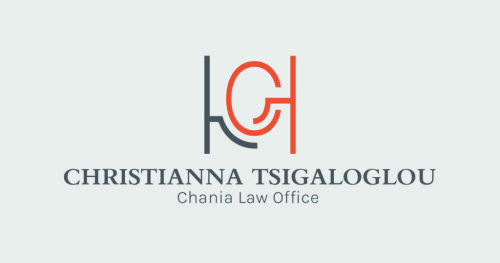Best Conveyancing Lawyers in Chania
Share your needs with us, get contacted by law firms.
Free. Takes 2 min.
Free Guide to Hiring a Real Estate Lawyer
List of the best lawyers in Chania, Greece
About Conveyancing Law in Chania, Greece
Conveyancing in Chania, Greece refers to the legal process of transferring the ownership of property from one person or entity to another. Due to Greece's unique legal and cadastral systems, the process involves strict compliance with both local and national laws. Chania, situated on the beautiful island of Crete, is a popular destination for real estate investments by both Greeks and foreigners. This has led to a robust local conveyancing practice, where property transactions must be carefully managed to avoid potential legal complications.
Why You May Need a Lawyer
Legal assistance is critical during the conveyancing process in Chania. Common situations where you may require a lawyer include:
- Purchasing or selling residential or commercial property
- Verifying a property's legal status and title history
- Preparation and review of sale contracts and other transactional documents
- Resolving inheritance issues and property disputes
- Assisting with obtaining necessary permits and ensuring compliance with zoning and building regulations
- Navigating the requirements for foreign buyers
- Facilitating tax aspects of the transaction, including property taxes and transfer taxes
- Handling mortgage or financing agreements
A qualified conveyancing lawyer will help safeguard your interests, ensure transparency, and avoid costly mistakes or legal disputes.
Local Laws Overview
Conveyancing in Chania is governed by a combination of Greek civil law, local municipal regulations, and the National Cadastre. Key legal aspects include:
- Title Search: Properties must have a clear legal title, free of liens or claims.
- Notarial Involvement: Property transfer deeds must be drafted and signed before a public notary.
- Due Diligence: Lawyers review property history to ensure no outstanding debts, mortgages, or zoning violations.
- Cadastre Registration: Every property transaction must be registered with the Hellenic Cadastre (Ktimatologio).
- Transfer Taxes and Fees: Buyers are generally responsible for transfer taxes and associated notarial and registration costs.
- Foreign Buyers: Specific documentation and approvals may be required, particularly for non-EU citizens.
- Building Permits and Use: Legal conformity of the property with relevant building and planning regulations must be confirmed.
Frequently Asked Questions
What is the role of a conveyancing lawyer in Chania?
A conveyancing lawyer manages the legal process of property transfer, conducts due diligence, drafts and reviews contracts, oversees payments of taxes and fees, and ensures proper registration with the authorities.
Is it mandatory to hire a lawyer for property transactions in Chania?
While Greek law no longer makes it obligatory to have a lawyer for all transactions, it is strongly recommended to protect your interests and avoid legal issues, especially for international or high-value transactions.
How long does the conveyancing process typically take?
The process can take from a few weeks to several months depending on the complexity, availability of documents, and involvement of multiple parties or permissions.
What documents are required for buying property?
Key documents include the title deed, certificates of tax clearance, property plans, energy efficiency certificate, identity documents, and proof of payment of property taxes.
Can foreigners buy property in Chania?
Yes, foreigners can purchase property in Chania. However, non-EU citizens may have to obtain special permits, particularly for properties close to border areas or for agricultural land.
Are there any hidden costs in the conveyancing process?
Beyond the purchase price, buyers should be aware of notary fees, lawyer fees, registration costs, transfer taxes, and, if relevant, agent commissions.
How is a property’s legal status verified?
Legal status is verified through a title search at the local land registry and cadastre. Lawyers check for liens, debts, building violations, and questions of ownership.
What taxes apply to property purchases?
The main tax is the property transfer tax (usually 3 percent of the sale price or the officially assessed value, whichever is higher) plus notarial and land registry fees.
What is the Hellenic Cadastre?
The Hellenic Cadastre is the official property registry in Greece. All transactions must be registered to establish legal ownership and protect against third-party claims.
What should I do if there is a legal dispute after purchasing property?
Contact a qualified real estate lawyer immediately. They can assess the issue, attempt a resolution, or represent you in negotiations or court if necessary.
Additional Resources
If you require further guidance, consider contacting the following organizations or bodies:
- Hellenic Bar Association
- Chania Bar Association
- Hellenic Cadastre offices (Ktimatologio)
- Chania Land Registry office
- Greek Ministry of Justice
- National and local real estate agents' associations
- Greek Ombudsman for property-related disputes
Next Steps
If you are contemplating a property transaction in Chania, Greece, here is how to proceed:
- Begin by identifying the property and ensuring your financing is in order
- Engage a reputable local conveyancing lawyer who understands both national and Chania-specific requirements
- Review all documentation with your lawyer before signing anything
- Ensure all legal checks are completed, including title and cadastral verification
- Have your lawyer negotiate and draft the final contract and oversee the signing at the notary
- Register the transaction promptly with the Hellenic Cadastre and local land registry
- Keep all transaction records and receipts for future reference or tax purposes
For personalized advice and legal representation, schedule a consultation with a qualified conveyancing lawyer in Chania. They will guide you through every step with clarity and professionalism.
Lawzana helps you find the best lawyers and law firms in Chania through a curated and pre-screened list of qualified legal professionals. Our platform offers rankings and detailed profiles of attorneys and law firms, allowing you to compare based on practice areas, including Conveyancing, experience, and client feedback.
Each profile includes a description of the firm's areas of practice, client reviews, team members and partners, year of establishment, spoken languages, office locations, contact information, social media presence, and any published articles or resources. Most firms on our platform speak English and are experienced in both local and international legal matters.
Get a quote from top-rated law firms in Chania, Greece — quickly, securely, and without unnecessary hassle.
Disclaimer:
The information provided on this page is for general informational purposes only and does not constitute legal advice. While we strive to ensure the accuracy and relevance of the content, legal information may change over time, and interpretations of the law can vary. You should always consult with a qualified legal professional for advice specific to your situation.
We disclaim all liability for actions taken or not taken based on the content of this page. If you believe any information is incorrect or outdated, please contact us, and we will review and update it where appropriate.











